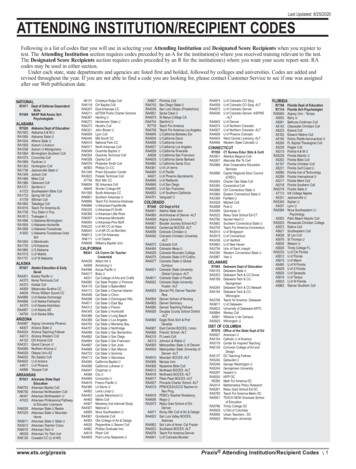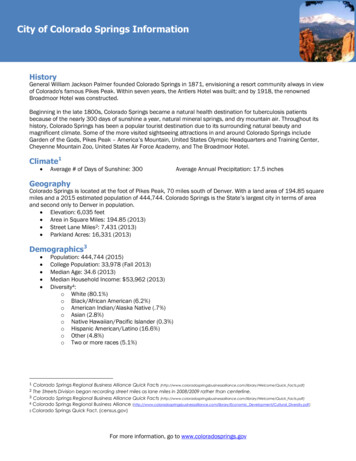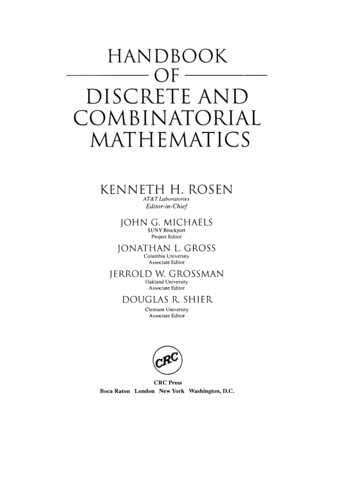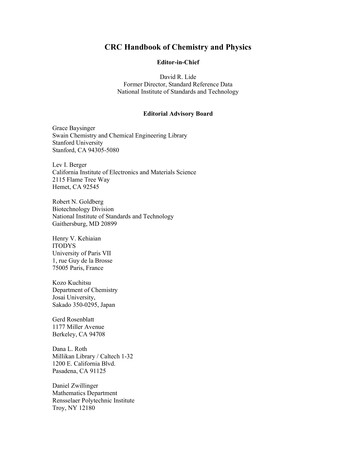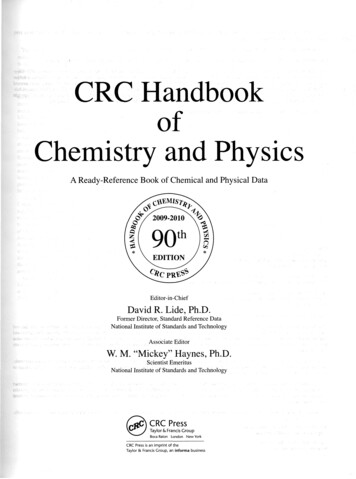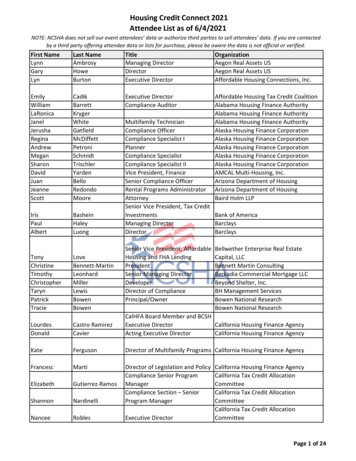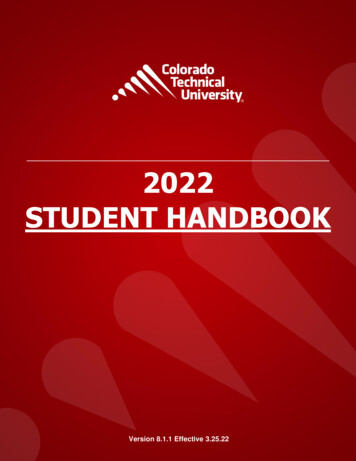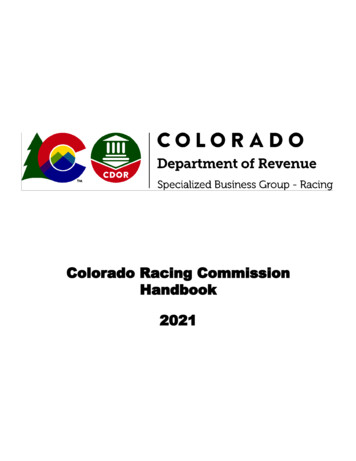
Transcription
Colorado Racing CommissionHandbook2021
2021 CRC HANDBOOKTable of ContentsWhat is a Racing Commission?.3New CommissionerOrientation .5Functions of aCommission 5The Open Meetings Act/CommissionMeetings . 7Public Records/Information Practices/Admin Procedures Acts .9Racing Officials:Stewards . .14Racing Officials: VitalPersonnel 19-23i.ii.iii.iv.v.vi.vii.viii.ix.Page 2Veterinarians/Assistants . .19CommissionInvestigator .19RacingSecretary .19Placing, Patrol, and Paddock Judges .20Clerk ofScales .21Jockey’s RoomCustodian .21Starter/AssistantStarter/Identifier .21OfficialTimer/Clockers .22Outriders/PonyRiders .22
2021 CRC HANDBOOKx.xi.xii.xiii.xiv.xv.Handicapper .23Horseman’s Bookkeepers. .23MutuelManager .23Horseshoers .23PhotoFinish/Timer . .23TrackAnnouncer 23Glossary of Racing and Pari-Mutuel WageringTerms .24-34Appendix A- Being a Board Member for the State of Colorado . .35i.ii.iii.iv.Key Guidelines for BoardService .36Ethics andResponsibilities 38Code of EthicsPolicy .41Per Diem andReimbursements 46Appendix B- Processes of Boards andCommissions .47i.ii.iii.iv.v.vi.Page 3Licensure/The ComplaintProcess . 48Hearings, Initial Decisions and Final Agency Orders .50Robert’s Rules ofOrder. .52Policy andRules .53Legislativeprocess .55Sunrise and SunsetReviews 56
2021 CRC HANDBOOKvii.RelevantLaws .57What is a Racing Commission?A racing commission is an administrative body that performs quasi-legislative and quasi-judicialfunctions. Commissioners have the authority to adopt rules and regulations, enforce thoserules, and impose civil penalties (fines and license suspensions) on violators. While at firstblush, this procedure might appear to some to be a conflict of interest, it is not uncommon inthe governmental regulatory process. Agencies such as public service commissions and realestate boards have the power to both adopt regulations and penalize violators.However, because of this unique situation, every racing commissioner must be alert to possiblechallenges to this authority to act and be prepared to excuse himself/herself from any case inwhich there is an actual conflict. Whenever possible a commissioner should also excusehimself/herself from any matter in which there is a possible or an apparent conflict of interest.When a case has been appealed to the commission from the stewards or judges or when a caseis pending before the commission on the basis of another form of complaint, eachcommissioner must be careful not to engage in ex-parte communications. Those arecommunications involving any one of the parties to the case and not conducted in the presenceof all parties. Just as a judge should not discuss a case pending in a criminal or civil court outsideof the judicial process, commissioners should not conduct their own investigation of a case ortalk privately with anyone about a pending case.Positions on racing commission often are high-profile appointments. As such, racingcommissioners are fair game for any reporter who wants to get his byline on the front page of anewspaper. In some newsrooms, a story about a commissioner getting a free beer and a hotdog at the local track may get equal or bigger headlines than a story about a congressmansteering government contracts to his family owned business . Newly appointed commissionersshould check with their legal counsel and become fully aware of any requirements andrestrictions placed on them by the state's ethics laws or financial disclosure laws.In its internal operation, the racing commission is similar to the board of directors of acorporation. The commission executive director (or executive secretary) is the equivalent of acorporate general manager or chief operating officer.Page 4
2021 CRC HANDBOOKThe size of the commission staff varies in each jurisdiction. Commission stewards, judges,veterinarians, investigators and administrative and fiscal officers serve as "department heads"and report to the executive director. Depending on the law of the jurisdiction, racingcommission employees may be civil service employees or may be political appointees or acombination.Just as the board of directors of a corporation establishes corporate policy and then relies onmanagement to carry out the details, it is generally advisable for part-time commissioners toconcentrate on the adoption of rules and board policies and to resist the temptation to becomeinvolved in day-to-day administrative and personnel matters. They should rely on thecommission staff and officials to implement policies, enforce rules and handle personnel tatters.Because of the nature of the manner in which a racing commission conducts its business, it iseasy for a commissioner to overlook the vast majority of licensees who never appear before thecommission. (An old adage of racing enforcement is that 5 percent of the licensees cause 95percent of the problems.) The vast majority of licensees are honest, hardworking people whocompete by the rules. Track management, drivers, jockeys, trainers, breeders and trackemployee unions have representatives who frequently appear before commissions to expressthe views of the groups they represent. The 2.00 bettors rarely appear before the commissionsor attend commission meetings and have no lobbyist to represent them. Above all else, a racingcommissioner must always keep in mind the interest of the public -- the patrons who attend andwager on the races, and the taxpayers who receive the revenue from pari-mutuel taxes and whopay the commission's bills.Because one cannot knowledgeably regulate a business that one does not understand, racingcommissioners should make an effort to learn the general aspects of all segments of thepari-mutuel industry under their jurisdiction.Things racing commissioners can do to learn more about the industry and become effectiveregulators include:Page 5A.Visit and tour racetracks, simulcast facilities and OTB parlors.B.Visit the various stable or kennel areas, inspect accommodations and reviewsecurity controls.C.View a race from the vantage point of every official, namely, thestewards/judges, the placing judges, the paddock judge, the patrol judges, thestarter, the identifier and the veterinarians. This will help commissioners tobetter understand the officials' various functions and duties.D.Observe the calculating room and totalisator control room, and remain thereduring a complete cycle from "off time" to "official." Commissioners should alsotour the pari-mutuel lines.
2021 CRC HANDBOOKE.Observe the entire procedure of urine and blood sampling and laboratorytesting.F.Occasionally observe a stewards'/judges' hearing or a hearing before a referee toassess the nature and propriety of the administrative justice process. (Note: Inthe event that this particular case is appealed to the commission, acommissioner who was present at the stewards'/judges' hearing should excusehimself/herself from acting on the appeal.)G.Read news articles dealing with racing matters and request further informationon any matter requiring clarification.H.Spend a significant amount of time on memoranda and position papers furnishedfor background information prior to commission meetings and request clarifyinginformation when necessary.I.Meet in public settings or workshops with representatives of racing associations,trade and professional organizations and employee organizations in order tounderstand their varying objectives.J.Attend conventions of NAPRA and participate in all matters important to thewelfare of racing.New Commissioner OrientationShortly after being appointed to a racing commission, a new commissioner should received anorientation packet and briefing from the commission's executive director. The exact contents of this willdepend on the number of tracks regulated by the commission and the commissioner's familiarity withongoing activities of the commission. For example, in some states, by law, commission members mustnot have any financial interest in racing while in other states commission appointees represent certainsegments of the industry such as horse owner or horse breeder. In those cases, newly appointedcommissioners may have more first-hand knowledge about recent activities of the commission. Thisorientation packet should include the following items: Page 6A list of other commission members, addresses and phone numbers as well as theaddresses and phone numbers of chief staff persons and other governmental liaisonssuch as an Assistant Attorney General assigned to the commission.
2021 CRC HANDBOOK An organizational chart of the commission. A list of the regularly scheduled commission meetings for the upcoming months oryears. A copy of the state law regulating the racing commission. A copy of the state's open meetings law. A copy of the state's Administrative Procedures Act. A copy of the rules of racing. Minutes of the meetings going back for approximately one year. A copy of the commission's working budget. A copy of any pending or recently adopted legislation that would affect the commission'sactivities.Some states may require certain documents to be signed by the commissioner and filed with a stateagency. These may include such things as a financial disclosure form or an oath of office.The executive director should brief the newly appointed commissioner on state travel requirements.Usually the state will only reimburse a commissioner up to a certain amount for meals, lodging andout-of-state travel. Most commissioners who attend out-of-state conferences and conventions will soonfind that the state does not reimburse all expenses.A state may also have particular travel regulations covering such items as pre-paid tickets, pre-paidlodging, pre-paid registration fees and other expenses. In most cases commissioner's spouses or otherfamily members are allowed to travel with the commissioners but not at any expense to the state.The commissioner should become aware of the state's ethics laws particularly regarding acceptance ofgratuities from individuals or corporations that the commission regulates. The state may also have lawsthat limit the commissioner's activity for a period of time after his term expires.For example, in some cases a commission member cannot go to work for an industry that he hasregulated for a period of one to three years.During this briefing, the newly appointed commissioner should feel free to ask any questions no matterhow minor the details. What may appear to be a perfectly innocent business lunch could develop into afront page story alleging violations of the ethics law (for accepting a free lunch) and for violation ofadministrative procedures law by ex-parte communication.The safest course of action for a commissioner is to avoid any appearance of impropriety. If thecommissioner believes that anything in which he or a close family member or business partner isinvolved may in any way influence a decision, the commissioner's best course of action would be toexcuse himself/herself from any participation in the discussion of that issue and any vote taken on thatissue.Page 7
2021 CRC HANDBOOKFUNCTIONS OF A COMMISSIONThe mission of a racing commission is to regulate activities on which there is pari-mutuel wagering while:*Assuring protection of the public;*Encouraging agriculture and the breeding of horses and/or greyhounds in the state (province);*Generating public revenue;*Providing uniformity of regulation for each type of racing or other pari-mutuel activity (jai-alai).Principal responsibilities of a commission are:*Promulgating and revising rules and regulations for the protection of the public;*Promulgating and revising rules and regulations for racing and pari-mutuel wagering;*Adjudicating controversies arising from the interpretation and application of laws andregulations dealing with racing and pari-mutuel wagering;*Licensing each racing association, each satellite (off-track) wagering facility, and all persons,other than the public at large, who participate in a race meeting with pari-mutuel wagering; and*Allocating racing and simulcasting dates.In carrying out these responsibilities, racing commissioners are guided by their own rules and regulationsand state laws, most significantly state racing and pari-mutuel statutes and administrative proceduresacts.Rulemaking:State administrative procedures acts usually specify the manner in which rules and regulations can bepromulgated.Typical rulemaking process:Step 1. Commission staff proposes new or amended regulations;Step 2. Proposed rules are reviewed by the commission's legal counsel or the state attorney general'soffice;Page 8
2021 CRC HANDBOOKStep 3. Proposed rules are published in an official government periodical (similar to the Federal Register)or in daily newspapers, thereby giving notice to the public of such proposed rules;Step 4. There is a public comment opportunity, usually in the form of a public hearing to affordinterested parties a chance to comment or suggest rule changes;Step 5. There is a "waiting period" of 30 to 90 days during which time no action can be taken onproposed rules. This period allows for additional written comments from interested parties; andStep 6. The proposed new or amended rules are adopted by the commission.Adjudication:When adjudication controversies arise from the interpretation and application of the commission's rules(or state racing laws), the racing commission acts as a quasi-judicial body, similar to a court. Thecommission can become involved in the adjudication of controversies in either of two ways: on appeal bya licensee from a decision of the stewards/judges or on its own initiative. In either case, the proceduresfor hearing and resolving these controversies are spelled out in the commission's rules and stateadministrative procedures acts. The same basic rights and procedures apply as if the case were beingheard by a judge in a courtroom.Typical adjudication processStep 1. The person charged with a violation must be informed in writing of the specific rule or law he/sheis alleged to have violated;Step 2. All parties involved must be notified of the time and place of the hearing;Step 3. Accused can elect to have either a formal or informal hearing with commission;Step 4. At formal hearing, those accused must be given right to call witnesses, make statements on theirown behalf and question witnesses who testify against them. The accused at both a formal and informalhearing have the right to have legal counsel present;Step 5. If formal hearing is used, all witnesses should be given an oath and the entire proceeding shouldbe audio-taped if a court reporter is not used;Step 6. Commission renders decision. (Usually restricted to civil fine or penalty, such as monetary fine,suspension or revocation of license); andStep 7. Persons who feel they have been treated unfairly by the commission may appeal to state civilcourt.LicensingCommission rules and racing laws provide the general procedures for the issuing of licenses to racetracksand persons who work at them. For example, state or provincial laws may specify certain minimum agesPage 9
2021 CRC HANDBOOKfor those working at a racetrack and may contain some general statements of disqualification, such asone's having been convicted of a felony, or a crime involving racketeering, bookmaking or race fixing.The licensing decisions regarding the issuance of licenses to racetracks are made at the commission level(by commissioners). Virtually all decisions regarding the issuance of individual licenses are made bycommission representatives at the tracks, usually stewards/judges or license administrators. However, inmost jurisdictions, stewards/judges or commission staff cannot deny a license. The denial must be madeby the racing commission after a hearing.Allocation of racing dates:The allocation of racing dates can be one of the most important and often controversial matters to comebefore a commission. This is especially true in jurisdictions where two or more tracks are located in thesame metropolitan area and compete for the same patrons and/ or stables/kennels.In such circumstances, the request for dates should be handled in the same manner as if it were acontested case pending before the commission on appeal. That is, all of the testimony should be given ata meeting or hearing at which all interested parties have notice and can question witnesses. Thereshould be no independent communication between any commissioner and interested party. Thecommission must ultimately make a decision based on its collective judgment of what is both best andfair for the public, the track investors, and the industry.Allocation of simulcasting rights:Racing commissions have the important and often controversial task of allocating simulcasting dates andrights. Commissioners should familiarize themselves with applicable federal and state laws in this area.Open Meetings and Records Laws:Page 10
2021 CRC HANDBOOKNearly every state has “Open Meetings Laws”, sometimes called “Sunshine Laws”, which require thatalmost all of the business of a regulatory body be conducted in sessions open to the public. The lawsalso require that every document filed with the racing commission or similar agency is a public recordunless specifically exempted and treated as a confidential document by law. Requirements for publicnotice of meetings and the types of documents that are to be treated as confidential vary from onejurisdiction to another. The general rule is that all meetings must be held in public session and mostdocuments on file with the commission are public record.Newly appointed commissioners should be aware that almost every document prepared by or mailed toa state agency is a public record that can be reviewed and copied by any interested citizen.Meetings of public bodies are always conducted in open session and with a notice of meeting usuallywith a proposed agenda mailed to any interested person prior to the meeting. All meetings must beconvened in open session. State law usually requires some method of recording the meeting. This maybe with a court stenographer preparing a printed transcript or a simple audio tape recording may sufficedepending on state law.The commission may adjourn into executive session for a limited number of purposes. The generalexceptions when commissions can legally meet in closed session include:1.To discuss “the good name and character of an individual” in personnel actions;2.To meet with legal counsel to discuss litigation; and3.To deliberate a disciplinary matter when they are acting in a quasi-judicial manner, suchas immediately following a hearing.To reiterate, these purposes will be specified in the state law but are usually limited to items such asdiscussing personnel issues, discussing pending litigation, or deliberating on facts and testimony heard inopen session before rendering a decision (like a jury deliberating after the testimony has been given in atrial.) However, any official action concerning matters that are discussed in executive session must bemade at an open portion of the meeting. That means that after the discussion has been held behindclosed doors, the commission must come back into a public area and a motion must be made, secondedand voted on in open session. No person should repeat any of the details or comments that werediscussed in executive session. In some states a violation of the open meetings law is a criminal offense.The following, adapted from a paper prepared by the staff of the California Horse Racing Board, detailsthat group's policies and procedures regarding open meetings and public records. While it makes specificreference to the California law and the policies of a particular racing board, the general requirements aresimilar in almost every state. Commission policy regarding dates of meetings, amount of advance noticeand the time for submitting documents to commission members and staff varies depending upon thecircumstances of each commission. Some commissions pre-determine meeting dates, such as the thirdTuesday of every month, while other commissions set their meeting dates from one meeting to the nextbased on anticipated agenda items, special events requiring commission approval, and the individualcalendars of the commissioners.THE OPEN MEETINGS ACT, THE PUBLIC RECORDS ACT, AND THEINFORMATION PRACTICES ACTPage 11
2021 CRC HANDBOOKGENERAL POLICIES AND PROCEDURESCommissions have an important responsibility to educate the public about problems, developments andother horseracing issues under their jurisdiction.In addition to legal requirements governing notice and conduct of board meetings, commissions shouldactively solicit public participation and encourage various points of view.Commissions should assign a high priority to the dissemination of information concerning deceptive andfraudulent businesses or professional practices. The public also needs to know the laws and rules thatguarantee their rights and how to redress abuses. Public interest is served by commissions promotingsuch industry knowledge.INQUIRIES FROM THE NEWS MEDIA OR THE PUBLICOn matters of commission or administrative policy, executive officers and commission members shouldnot release preliminary data, speculate, interpret facts, predict possible or probable courses of action, orfuture courses of action on matters of departmental or administration policy to inquiries from the publicor the press, radio or television. They should refer such inquiries to the Chairman.THE OPEN MEETINGS ACTThe Open Meetings Act governs meetings of regulatory boards and meetings of committees of thoseboards when the committees consist of more than two members. It specifies meeting notice and agendarequirements and prohibits discussion or action on matters not included on the agenda.Commission PolicyAll meetings and examinations should be held in state buildings or similar meeting places for maximumaccessibility by the general public and the disabled.Meetings should be held as often as necessary, but certainly no less often than required by the statute. A"meeting" is any function in which a quorum is required for transaction of business. Examinations arenot meetings.Notices of each meeting must be provided to the public and to the commission members, in the timeframe required by law, or at least ten (10) days prior to the meeting date. Commission members shouldreceive their complete meeting packets at least seven (7) days in advance of the meeting to allowadequate time for review.Open Meetings Requirements and ExceptionsThe Legislature has indicated its intent regarding the meetings of state agencies: "It is the public policy ofthis state that public agencies exist to aid in the conduct of the people's business and (that) proceedingsof public agencies be conducted openly so that the public may remain informed." The Open MeetingsAct applies to commission meetings as well as to meetings of committees when the committee has morethan two members.Page 12
2021 CRC HANDBOOKThe Executive Secretary or other designated staff person must ensure that notices of meetings aremailed to persons who have requested notice at least ten (10) days in advance of the meeting. TheExecutive Secretary must also ensure that agendas are properly prepared and that any documents to bediscussed at an open session of the meeting are made available to the public.Although most meeting agenda matters must be conducted in open session, the Open Meetings Lawprovides exemptions where matters may be conducted in closed session. Only those matters specificallyindicated by statute may be acted upon in closed session.The exceptions most relevant to the racing commission are:Personnel MattersA board may convene in a closed session to consider the employment or dismissal of a publicemployee or to hear complaints or charges brought against an employee by another person. Atleast twenty-four (24) hours prior to holding such a closed session, the employee must be givennotice of his/her rights to have the matter considered in open session. If the employee acceptsthis option, a closed session is prohibited. This exception does not apply to (board) employeeswho are appointed to their positions.ExaminationsA commission or its staff may meet in closed session to "prepare, approve, grade or administerexaminations.” Essentially, this includes any discussion regarding the actual content ofexaminations. In addition, where the commission or one of its committees convenes to considera candidate's credentials for licensure or to determine initial eligibility to sit for examination, ifthe disclosure of eligibility information or credentialing information is deemed to involve aninvasion of privacy of the candidate or other persons, the meeting is exempt from openmeetings requirements.EnforcementA commission may go into closed session to deliberate upon a proposed decision, a stipulationor to decide an administrative disciplinary matter.LitigationA board may go into closed session to confer with its legal counsel regarding pending litigation.The commission must conduct in open session all matters other than those specifically authorized bystatute. The commission may not discuss items of business not included on the noticed agenda unlessthe item is raised in comments by the public during the meeting. In such case, the item should bediscussed only to the extent necessary to determine whether it should be an agenda item at a futuremeeting. On any matter where discussion, deliberation or action taken is required to be in open session,the vote cannot be taken by secret ballot.Minutes - Public MeetingsPage 13
2021 CRC HANDBOOKMinutes of open meetings should be kept by the Executive Secretary or designee. Such minutes areintended to establish a public record of the proceedings and to summarize the actions taken at suchmeetings.Minutes - Closed SessionsMinutes of closed sessions must, as a matter of law, be recorded in a separate minute book maintainedby a member of the Board or a designated employee.Minutes should report topics discussed, actions taken and members in attendance. This book is aconfidential document and should not be treated as a public record.PUBLIC RECORDS ACTThe Public Records Act is based upon the premise that the business of the state is open to the publicunless specifically exempted from disclosure. Records exempt from disclosure are set forth in the act.This act provides that the records of all public agencies shall be made available during business hours toany interested party. Exceptions to this rule include examination information, investigation or securityfiles, records of litigation to which the board is a party, and other specific items. A board mustdetermine, within ten (10) days of receipt of a request for public records, whether it will comply with therequest and immediately notify the requester of its determination. The ten (10) day period may beextended by not more than ten (10) working days when specified, unusual circumstances exist. In orderto assure compliance with this time limit, when a board has questions concerning a request for publicrecords, the request should be submitted immediately for review to the Deputy Attorney Generalassigned to the commission.INFORMATION PRACTICES ACTSInformation Practices Acts also govern the disclosure of records maintained by state agencies and areaimed at protecting the privacy of the subjects of those records. These statutes define what is"personal" information regarding data that government requires to be submitted by individuals on awhole array of applications, documents and other government forms, and imposes limitations on thedisclosure of that information, including criminal sanctions and civil penalties for wrongful disclosure ofprotected information. Because of the difficulty of reconciling the provisions of the Public Records Actwith those of the Information Practices Act, commissions and their staffs are advised to seek theassistance of their Deputy Attorneys General when conflicts appear regarding requests for information.Page 14
2021 CRC HANDBOOKADMINISTRATIVE PROCEDURES ACTAll state agencies must operate in conformance with state laws commonly known as an AdministrativeProcedures Act. This means that the state agency must have a particular rule or statute violation in mindbefore commencing an action. The individual who has been accused of wrongdoing must be given anotice of hearing usually at least fifteen (15) days in advance of the hearing. This notice must contain astatement of the time, place and nature of the hearing; a statement describing the act and rule or lawwhich was violated.The notice must include a statement of any action that is authorized by law. (For example, thecommission may impose a fine, suspend or revoke your license as a trainer.)The party must be informed that this is an adversarial proceeding and that the party charged has a rightto be present at the hearing, to be represented by a lawyer and
2021 CRC HANDBOOK The size of the commission staff varies in each jurisdiction. Commission stewards, judges, veterinarians, investigators and administrative and fiscal officers serve as "department heads" and re
